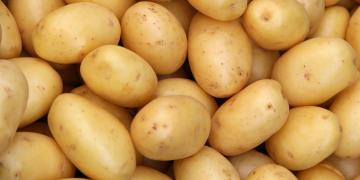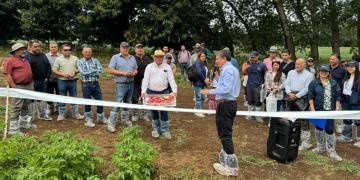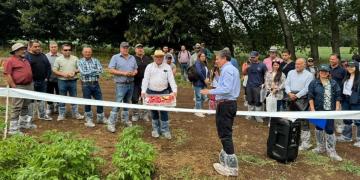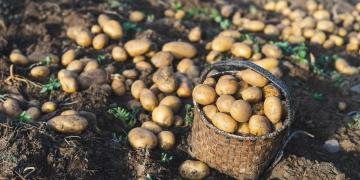Lithuania: Dangerous bacterial potato disease spreads
Potatoes are one of the most important food products in Lithuania, but potato growers still face challenges that threaten their yield and quality. Experts warn of quarantine diseases, particularly ring rot.
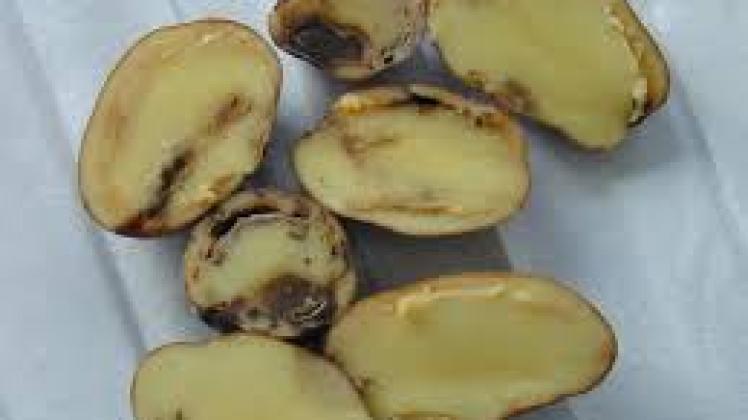
Ring rot continues to spread in Lithuania
According to the data of the National Plant Breeding Service of the Ministry of Agriculture (hereinafter referred to as the Plant Breeding Service), potato ring rot (lat. Clavibacter sepedonicus) Outbreaks of this pest are detected every year. While 2,022 outbreaks were recorded in 1935, 2,024 new outbreaks were detected in 1914, experts recommend not to rejoice too quickly at this statistical development.
"Approximately 30 to 50 percent of outbreaks occur in the crops of non-professional farmers – those who grow potatoes for their own needs and do not sell them," explains Yuri Kornienko, director of the Plant Breeding Service. "These producers most often plant uncertified seeds purchased at markets or through advertisements, and often use seeds from previous years, which significantly increases the risk of the disease occurring."
Growing the same potatoes on a farm for years is a dangerous practice
Although Lithuanian potato growers are actively pursuing innovations and applying cutting-edge technologies, some of them continue to resort to an "outdated" practice: planting propagated potatoes on the same farm every year, without using certified seeds. "My grandfathers and parents grew them, and I will continue the tradition," "This is the best for the cepelinai," "The seller said it was the best": farmers who pay little attention to the prevention of potato quarantine diseases are seeking to justify themselves or deceive themselves. Such a practice is often associated with the desire to save money, but in the long run, it does more harm than good.
"There is still a strong tradition of planting farm-grown potatoes without using certified seeds. This practice is often used for cost-effective reasons, but it has serious consequences: not renewing seeds increases the risk of spreading diseases, particularly bacterial ones," emphasizes the director of the Plant Breeding Service.
During storage, it is necessary to monitor whether the potatoes rot.
Potato harvest sorting and storage facilities also provide a favorable environment for the survival and multiplication of the pathogen responsible for ring rot. Damaged potatoes can transmit the infection to healthy potatoes. The progression of the disease is difficult to predict, but the consequences for farmers vary. Plant Protection Service specialists recommend disinfecting storage facilities before storing a new harvest.
Fields where potentially infected potatoes were grown should not be used to grow potatoes and other plants of the potato family for at least two years to ensure that no potato plants have germinated for two consecutive years.
Climate change increases the spread of bacterial diseases
The Plant Breeding Service also points out that due to climate change, warmer winters and wetter summers create favorable conditions for the establishment in Lithuania of new pests from southern regions. One of them is potato brown rot (lat. Ralstonia solanacearum). This is a bacterium that can overwinter in potato residues, water, and even the roots of water lilies, which are often found on the banks of bodies of water. When the water temperature exceeds 15 °C, the bacterium spreads and can even infect crops through irrigation water.
Crop Services Recommendations for protection against potato diseases:
Use certified seeds
Specialists from the Plant Breeding Service remind us that the most effective protection against potato bacterial wilt is the use of certified seeds. All certified potatoes grown in Lithuania have been laboratory tested. In Lithuania, this disease has not been detected on certified seed potatoes for over ten years; therefore, healthy seeds are the most reliable preventive measure. Seed potatoes are usually sold packaged in bags of various sizes. Each bag usually has a plant passport (a label). When purchasing seed potatoes sold unpackaged, it is necessary to request a plant passport and a quality label. If the seller refuses to provide them, please report such cases to the Plant Breeding Service by calling the hotline (0 5) 270 80 80 or by any other means indicated on the website.
Disinfect equipment and warehouses
To prevent the spread of infection through stocks or potatoes during storage, it is recommended to use the only registered plant protection product, "Menno Florades", for the disinfection of machinery, equipment and warehouses. Disinfection is particularly important when storing potatoes in used packaging (big bags, containers, etc.) or in the storage room for storing new batches of potatoes grown in other fields or purchased.
Avoid unofficial shopping places
The Plant Breeding Service warns against purchasing seed potatoes from unreliable sources. Purchasing potatoes from individuals who conceal their identity and do not disclose their origin carries a high risk of acquiring tubers potentially infected with quarantine pests, including potato bacterial wilt or cyst nematodes.
It is important to note that potatoes intended for consumption must also be labeled. The label must indicate the registration certificate number of the producer, buyer, and seller in the phytosanitary register, the potato variety, and the batch number.
Follow crop rotation and other preventative measures
Preventive measures, such as crop rotation, the use of certified seeds, and disinfection of machinery and warehouses, are essential to reduce the risk of quarantine diseases, as well as other common potato diseases (including dry or wet rot during storage). Although these measures are costly, the greater the investment in prevention, the greater the long-term economic return.
Contact the department and have laboratory tests carried out
The Plant Protection Service welcomes the fact that farmers voluntarily contact its plant protection laboratory to test soil and tuber samples for potato quarantine diseases. However, these preventive tests remain exceptional, although they are an essential step for those who are constantly concerned about the phytosanitary situation on their farm. The Plant Protection Service’s specialists hope that in the future, more and more Lithuanian potato growers will conduct preventive tests to detect quarantine diseases in their crops. This will help prevent significant crop losses or business restrictions.
Fuente: madeinvilnius.lt

